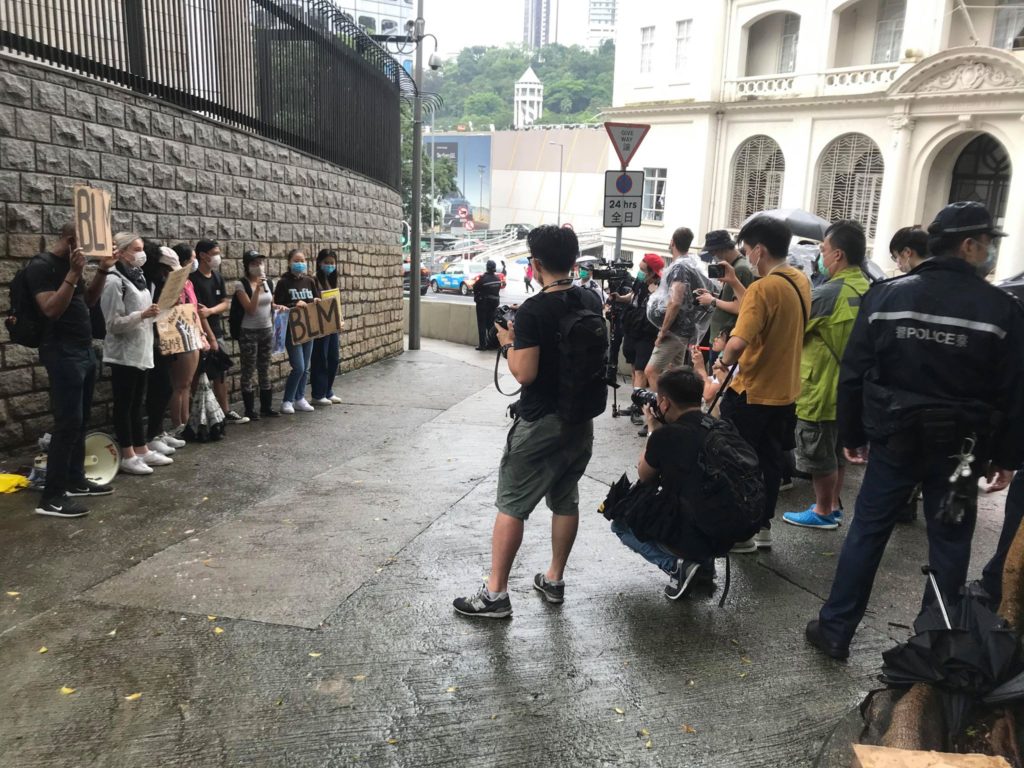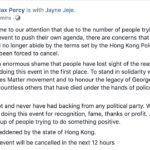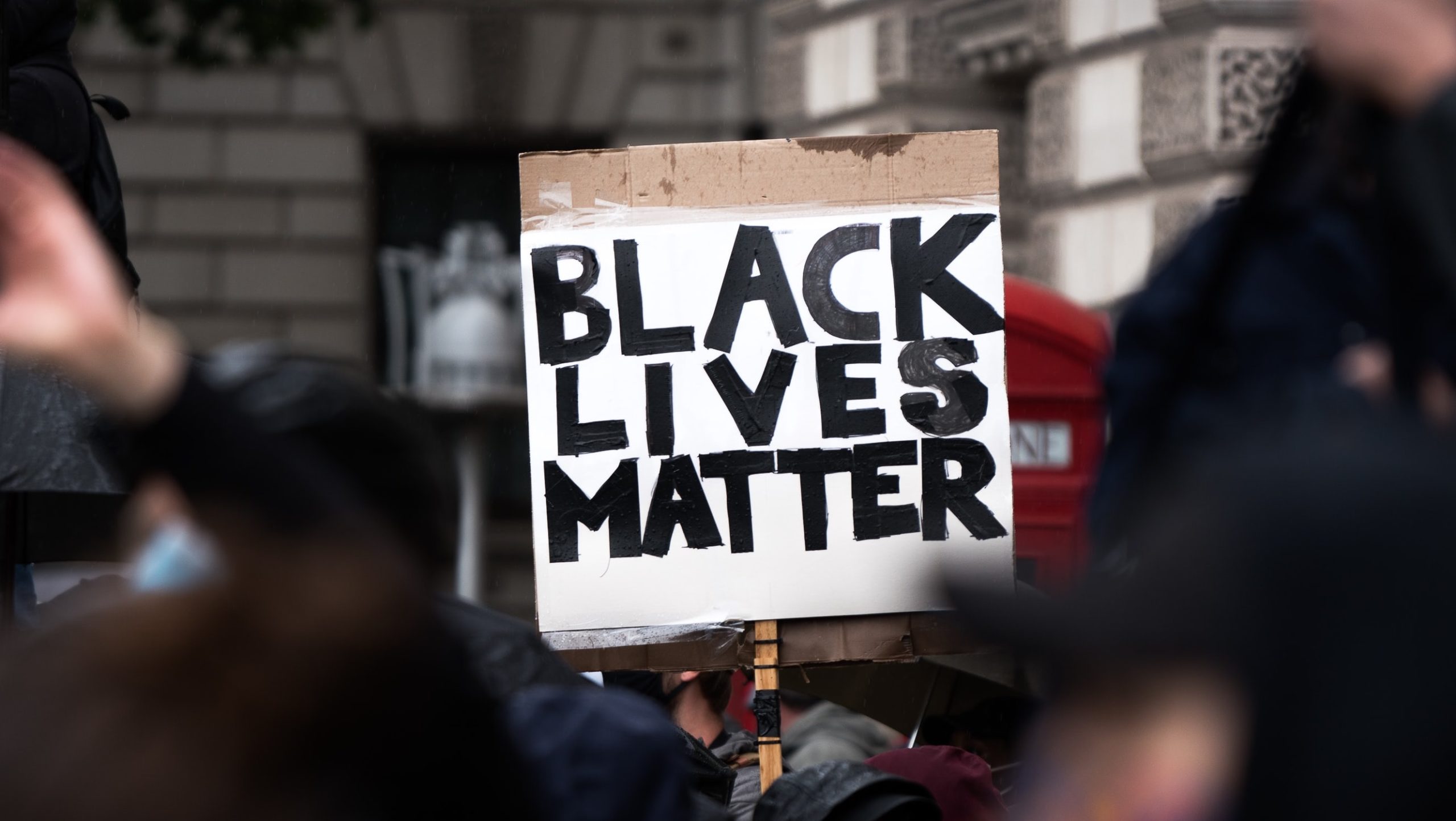When supporters of the Black Lives Matter movement in Hong Kong decided to organize a solidarity march, they never thought they’d draw the ire of the city’s pro-democracy protesters.
Activists were going to give speeches about black history. Artists had rehearsed poems. Speakers, many of them black people living in Hong Kong, had prepared poignant stories about their experiences in the city.
But last Sunday, none of that went according to plan. The march was canceled less than 24 hours before it was due to begin. A procession of about 20 people marched to the US Consulate anyway, and the organizer, Max Percy, read out a statement condemning police brutality towards black Americans in the US. Then, everyone dispersed.

What was meant to be a thoughtfully planned three-hour event was over in about 45 minutes, falling short of rousing the vigor and emotion that organizers had hoped it would. The turnout of the march last Sunday was a far cry from the 1,600 people that had clicked “attend” on the Facebook event before it was canceled—then deleted—less than a day before it was scheduled.

Millions around the world have taken part in Black Lives Matter events to show solidarity with the US movement.
But in Hong Kong, where protests continue and a Beijing-mandated security law looms, politics got in the way of the march’s single intention: to take a stand against systemic racism towards BIPOC (black, indigenous, people of color) in the US and globally.
‘We have received the go ahead’
Aside from a misunderstanding that Africa Center (a group that promotes interactions between African and non-African communities) was co-hosting the event, all was calm until Saturday.
That morning, one of the march organizers shared an update about the demonstration on the Facebook event page. One particular line caught the attention of many: “We have been in touch with Central Police Station’s Ass. Public Order Events Liaison Officer and we have received the go ahead.”
The post added that “due to COVID-19, no public gathering permits are being given out,” referring to a letter of no objection (LONO). The document is needed for public meetings of more than 50 persons and public processions of more than 30 persons to take place.
Immediately, comments flooded in, asking if the event had received a LONO, and if yes, whether organizers could post it.
There was reason for the concern—by law, such events without a LONO can be declared an illegal assembly, which would provide the basis for police to carry out arrests. (Anti-government protests have ended with demonstrators hauled onto police vans. And organizers of the Tiananmen vigil last week, which was unapproved, now reportedly face charges for “inciting others to participate in an unauthorized assembly.”)
Jayne, an African-American who asked to go by her first name, was a co-organizer of the march. She wrote on the Facebook page that she had been “dealing with the HKPF (Hong Kong Police Force)” but that they did not issue the LONO—giving the impression that any “go ahead” given was unofficial. Despite repeated comments, she declined to post her communication with the police.
Jayne, however, maintains that there was nothing more she could have done to appease concerns. “We have been transparent, but that was still not enough. We told you exactly what the police said, but that was not enough,” she wrote in another post.
No paper trail
Organizers said they did not meet face-to-face and that their interaction with police was through phone calls, WhatsApp and email.
Jayne did not agree to send Coconuts Hong Kong any screenshots of correspondence with police, but said she would show them to a reporter in person. During the meeting, she quickly scrolled through a WhatsApp conversation between her and a woman who identified herself to be with the Hong Kong police.
In one message, the woman sent a scanned copy of the organizers’ application of a LONO they had submitted. She asked that they send an email to “cancel the application,” but immediately after said “now I will draft u the time slot for the event on sun to c if u r ok with it.” The woman did not address the inconsistency of asking that the march be formally scrapped, yet at the same time suggesting it could still go on.
The police contact then outlined how the “event on sun” should take place—including where and when marchers should meet, and that they must walk in groups of eight—but her language did not indicate that such an event would be legal. Jayne did not appear to ask.
Percy—who identifies as an ally of the black community—submitted the application for the LONO and said police seemed careful not to leave a paper trail. The email address they used to communicate with did not use the Hong Kong Police Force domain and did not contain a name, he explained.
“But they clearly wanted us to go ahead and said we would be fine,” Percy, who is from the UK but was born and raised in Hong Kong, told Coconuts.
The Police Public Relations Branch confirmed with Coconuts that they received the event application but that it was subsequently withdrawn. They did not respond to questions about whether somebody from the force had given any form of unofficial approval to the organizers.
A breakdown in communication
Hong Kong’s pro-democracy supporters were disappointed—some even angry—with how the event was organized.
On Twitter, many who were planning on attending the march expressed frustration that organizers were being evasive in not sharing their communication with the police, and were dismissive of their questions about safety.
“The organizers responded poorly to valid concerns. now trying to paint a narrative as if they were victimized,” one user said.
Some tweeted that the organizers of the march, as expatriates, were ignorant and did not understand the city’s political complexities or that police had effectively awarded them “expat privilege” by informally green-lighting their march.
I agree completely that the organiser of the aborted #BlackLivesMatter protest in #HongKong does not deserve the degree of vitriol that she received. That said, this response does demonstrate a lack of local awareness and sensitivity. (1/6) https://t.co/hxwRuUcCZ7
— Kevin Yam 任建峰 (@kevinkfyam) June 10, 2020
Given the confusion about whether or not the march had police approval, many felt that the earliest posts on Saturday morning should have spelled it out in black and white that the event did not have a LONO.
“If they had straight up said “We don’t have a LONO, [but] here is what we talked about with the police instead… I think many HongKongers would’ve been relieved,” said Angie, a protester who told Coconuts that she had been “100% planning to attend” the march before it was canceled.
Some Facebook users said their comments on the page were getting deleted, sparking further suspicion that the organizers were evading pertinent concerns about safety.
But Jayne defended the removals. “The comments started getting out of control when mistruths, bullying, accusations and profanities started flying about,” she said, adding that she deleted statements that were “misleading.”
Hong Kong for Black Lives Matter
Hong Kong, with a relatively small black population, has yet to respond to the Black Lives Matter movement with the gravity that many cities around the world have.
The Africa Center has been holding weekly Sunday discussions, with the third one coming up this Sunday. Innocent Mutanga, co-founder and CEO of the group, said the past two events have attracted 70 to 100 people.
A number of pro-democracy activists have voiced support for the movement through the lens of Hong Kong’s political context, often comparing the city’s unpopular police with law enforcers in the US.
Many of you have asked me about the ongoing U.S. protests. As a human-rights activist, I stand firmly on the side of the #BlackLivesMatter movement and oppose police brutality, wherever it may be. My Washington-based friend @jeffreychngo elaborates on our views in this thread. https://t.co/p9WnSK8bqs
— Joshua Wong 黃之鋒 😷 (@joshuawongcf) June 2, 2020
In Asia, crowds have taken to the streets of Seoul, South Korea and Osaka, Japan to protest systemic racism at the hands of American law enforcement. But Hong Kong hasn’t seen similar scenes.
“When I saw the world was [protesting], I thought, gosh we must do something here,” Jayne, who has been living in Hong Kong for eight years, said. “This is happening back in my home country. This personally affects me.”
As a black American, Jayne says she has been following the Black Lives Matter movement since it began in 2013. “I have an older son, brothers, nephews, uncles, and cousins who all live back in the US. Having any of them either hurt or killed at the hands of racists or the police has always been an active fear of mine,” she added. Having to cancel the march frustrated her.
Percy acknowledged that there were slips in their organization. “Sure it was a completely botched event,” he said. “We had an explosion of interest and we didn’t satisfy so many groups of people.”
He added: “The good that came out of the whole ordeal is that there are now several Black Lives Matter events springing up around Hong Kong.”
An opportunity for dialogue
The criticism that surrounded the disorganization of last Sunday’s march has prompted discussion about how the city can still show support for the BLM movement, politics and gathering bans withstanding.
Over the weekend, around 20 people disappointed with how the march was handled met up. Together, they talked about how they could plan an event where those attending could show support for the BLM movement legally and safely.
re: the hot mess that was the attempted HK-BLM march. I know it’s difficult to see beyond the negativity and I understand how disheartened everyone is, but let’s not forget who the real enemy is. this is a great opportunity for dialogue,so if you’re willing to help org smth hmu!
— ᜆᜒᜈ (@tineneil) June 6, 2020
Christine Vicera, a Filipino-born Hongkonger, said a fundraising gig at the end of this month, or early July, is in the works. The organizers are inviting black musicians—most of them hip-hop and R&B artists—to perform. The money raised will go towards bail funds to release protesters who have been jailed in the US.
If all goes well, Vicera says they will also hold a performance event combining spoken word poetry with music from local bands.
“Nothing is really set in stone yet, but we’re meeting again this Sunday to discuss,” she said.
Vicera, who works as a research assistant at the University of Hong Kong’s comparative literature department, says the institution’s Center for the Study of Globalization and Cultures is planning a series of educational seminars. The seminars will also aim to address the discrimination experienced by ethnic minorities in Hong Kong—in particular South Asians.
Referring to a case last month of a South Asian man who died at the hospital after police subdued him, she said: “I feel like it’s a perfect opportunity for dialogue to address the racism that exists even in our communities.”


